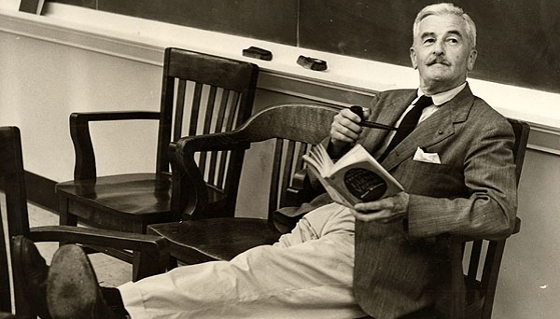BLACKOUT POETRY. INSPIRED BY
SECTION 4 FROM "THE BEAR" in FAULKNER'S
"GO DOWN, MOSES"
Consider the passage below from “The Bear” by William Faulkner (“Go Down, Moses). Delete all the words you consider necessary to make your own poem. This poem will distill the essence of the short story as you perceive it. Number of words : maximum 45
Source text for the poetry:
“not against the wilderness but against the land, not in pursuit and lust but in relinquishment, and in the commissary as it should have been, not the heart perhaps but certainly the solar-plexus of the repudiated and relinquished: the square, galleried, wooden building squatting like a portent above the fields whose laborers it still held in thrall ‘65 or no placarded over with advertisements for snuff and cures for chills and slaves and potions manufactured and sold by white men to bleach the pigment and straighten the hair of negroes that they might resemble the very race which for two hundred years had held them in bondage and from which for another hundred years not even a bloody civil war would have set them completely free.......himself and his cousin amid the old smells of cheese and salt meat and kerosene and harness, the ranked shelves of tobacco and overalls and bottled medicine and thread and plow-bolts, the barrels and the kegs of flour and meal and molasses and nails, the wall pegs dependant with plowlines and plowcollars and harnes and trace-chains, and the desk and the shelf above it on which rested the ledgers in which McCaslin recorded the slow outward trickle of food and supplies and equipment which returned each fall as cotton made and ginned and sold (two threads frail as truth and impalpable as equators yet cable-strong to bind for life them who made the cotton to the land their sweat fell on), and the older ledgers clumsy and archaic in size and shape, on the yellowed pages of which were recorded in the faded hand of his father Theophilus and his uncle Amodeus during the two decades before the Civil War, the manumission in title at least of Carothers McCaslin’s slaves--did own it. And not the first. Not alone and not the first since, as your Authority states, man was dispossessed of Eden. Not yet the second and still not alone, on down thorugh the tedious and shabby chronicle of His chosen sprung from Abraham, and of the sons of them who dispossessed Abraham, and of the five hundred years during which half the known world and all it contained was chattel to this plantation and all the life it contained was chattel and revokeless thrall to hi s commissary store and those ledgers yonder .....There are somethings He said in the Book, and some things reported of Him that He did not say. And I know what you will say now: That if truth is one thing to me and another thing to you, how will we choose which is truth? You don’t need to choose. The heart already knows." ("The Bear" (section 4), Go Down, Moses by William Faulkner)
This is how we see it:



